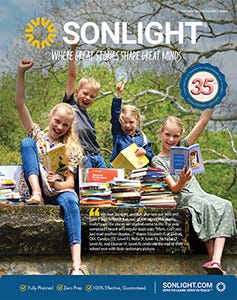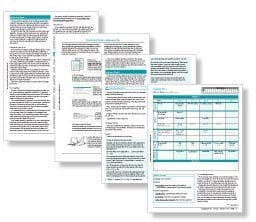We use cookies for performance, analytics and marketing. By using this site, you agree to our use of cookies. For more information, view our Cookie Notice and Privacy Policy.
What kind of people do I want my children to be?
Beyond academics, Sonlight encourages growth in character and spirit.
Compare your goals with ours...
Sonlight grew out of the reading, study, and hands-on experience of John and Sarita Holzmann as they educated their four children. It has also grown (and continues to grow) from the feedback and input we receive from our customers— homeschoolers like you!
We share the top goals we have had in mind as we have developed—and as we continue to develop—Sonlight Curriculum so that you can evaluate Sonlight in light of your goals.
Maybe you will adopt some of our goals. Maybe you will deliberately reject some. Either way, you will be better prepared to make wise decisions about homeschooling and whether or not Sonlight Curriculum is an appropriate choice for you. Here are our top goals:
Teach students to seek God's Kingdom above and beyond all else
We believe this is the primary goal Jesus set before all of us who claim to be His disciples. "Seek first His [God's] kingdom and His righteousness." (Matthew 6:33)
We want to keep that goal in front of ourselves and our students...at all times.
Create a learner's heart in students
What good does it do to fill children's minds with all manner of information if they never learn how to learn, or if they never acquire a heartfelt desire for education?
We want our kids to grow up with the same attitude and conviction Solomon had: "[Wisdom] is more profitable than silver and yields better returns than gold. She is more precious than rubies; nothing you desire can compare with her." (Proverbs 3:13-15)
When students want to learn, nothing will stop them from achieving their goal. But if educating our children is solely our goal for our children, we have to wonder: will they continue to educate themselves after "school" is done?
Consider the standard "social studies" approach to culture. Instead of having students learn first about things with which they are already familiar (our "community"), Sonlight takes almost exactly the opposite tack. We begin by exposing students to what is different and unfamiliar.
That way, you and your students enjoy the surprise factor, the delight factor, the ability to see, hear and experience things they wouldn't expect. That's part of the adventure of education.
Now, after they have become familiar with the unfamiliar, we reintroduce students to their own culture. Now they can compare, contrast, and see it all in a bigger light.
Besides our desire to create this sense of perspective, and to instill enthusiasm and interest, we focus on the unfamiliar and "foreign" because we want to...
Raise children with a godly heart for the world
God's plans are for all peoples. And we want never to forget what is foremost on God's heart. Thus we are unwilling to focus solely, or even primarily, on the West and western history.
What most kids can't imagine is that anyone lives differently than they do. Most have no idea that there is a big world around them filled with people who have completely different experiences from their own.
So, as I have just noted, we begin exposing students to world cultures and world history in Preschool and Kindergarten. And even when we study American history, we focus not only on the stuff of which standard histories are made—the political heroes, the battles and large social movements. We focus, too, on the smaller, more personal-scale social and cultural issues as well.
We also do what we can to help students understand history as it looks from the perspective of people who are outside the halls of power and who, for social or cultural reasons, just see things differently than we ourselves and "our own" people have always been taught to view them.
Inspire students to honor Christ boldly—in speech and conduct
We believe that the Christian faith is not merely intended to grant us eternal personal comfort; it is meant to change the way we live and, through us, to alter the world around us.
That's why, from the earliest years, we include materials that help children memorize Scripture and understand what the Bible is all about.
But the legacy of God's people extends far beyond the Scriptures. It continues to the present day. And we realize that, in order to emphasize this amazing legacy of God's people through the ages, we must provide children an historical and biographical view of the world.
We want children to find true heroes—people whose lives they can emulate, people whose lives they want to emulate.
We want them to read biographies that not only tell them about the good deeds that others have done and the wise habits these people have developed, but that help them see these people as they really were: people whom God used despite their shortcomings.
We want children to sense the excitement and challenge of following Jesus in big and little things—not only at home, at church, and in family relations, but also in the worlds of work and of cultural development.
We want children, through their reading, to see, know, understand, and be willing to make the sacrifices that they may be called upon to make if they are to fulfill God's purposes in their lives.
Train children to become winsome, effective ambassadors for Christ
Most curricula (especially Christian curricula) seem to focus entirely on "message" content— what we need to know and believe so that students will quickly recognize and reject (turn away from—or run away from) whatever is false.
Christians often justify this educational focus by referring to the U.S. Secret Service's method of preparing anti-counterfeit agents. New agents are made so familiar with honest-to-goodness $20, $50 and $100 bills that they are able to recognize counterfeit bills immediately.
We believe this analogy is good...to a point.
Interestingly, however, Scripture uses more "active" language than that of anti-counterfeit agents. The Apostle Paul speaks of ambassadors and soldiers for Christ. And ambassadors and soldiers don't merely identify the enemy or identify what is alien then turn or run away. They engage the enemy; they interact with whatever is not part of "their own".
And so, ambassadors must not only be intimately familiar with their authorized message. They must also know their audience. They must know what their audience thinks, believes, and values. They must know the places where their audience's mental, emotional and spiritual defenses are strong...and where they are weak.
Using the Biblical military analogy: soldiers for Christ must be taught not only to recognize who the enemy is (what is false); they must be taught to discover the peculiar strengths and weaknesses of the enemy, what strategies the enemy will use, and what strategies they may use against the enemy. Soldiers must also acquire a minimal amount of (at least simulated) combat experience before going into the fray.
All of these goals are ours in Sonlight Curriculum. Therefore, Sonlight is designed to...
Teach students how to listen well to others
The Greek philosopher Epictetus said, "We have two ears and one mouth so that we can listen twice as much as we speak." Those of us, especially, who wish to be effective communicators for Christ should do much more listening than talking...
It makes sense. The act of listening communicates powerfully to another person that "I care." After all, who would you believe really cared for you and to whom would you listen: someone who listens intently to what you have to say before giving a gracious and thoughtful reply, or someone who launches into a prepared monologue designed to "set you straight"?
We use two vehicles to teach students to listen. First, we have them listen while Mom or Dad reads.
Studies have shown, and we have seen it proven time and again: children whose parents read to them regularly and at length are far more capable of listening and understanding what they hear than are children whose parents read to them but little.
Sonlight Read-Aloud Classics will entice you and your children to read together...often, and at great length. And your children will learn to listen.
There is a second means by which we teach students to listen. And it has a slightly different purpose. We seek to convey different sides to an argument.
Many people—both children and adults—are afraid of what "the opposition" may say. Our minds become so filled with worry about our possible inability to reply appropriately that we never hear what the other person has to say.
So most of us are far more comfortable to remain ignorant of other people's claims than to first become familiar with what they have to say, and then to find quality answers or, possibly, to admit they have a point we had never thought about before.
Sonlight refuses to bow to this fear or laziness. This fits well with our next goal:
Teach students, through experience, that God is faithful— listening to other views won't destroy their faith
In other words, in the supportive environment of their parents' home—with the help of their parents—Sonlight teaches students the tools, techniques, knowledge and skills of godly intellectual warfare.
We want students to be convinced, through experience, that there are legitimate answers to questions coming from "the other side". Even when they don't happen to know the answers, they need not run in fear.
There is no need to fear because the truth— God's truth—will prevail. He who is in us truly is greater than he who is in the world (cf. 1 John 4:4). And He who is by our side really will give us the right words to say when the time comes (cf. Matthew 10:18-20). Students come to know this not just in their heads, as an article of faith, but in their hearts, through experience.
This is intimately tied to another goal Sonlight pursues:
Inspire students to fulfill the work of true scholars
Through the books we have chosen and through our instructor's guides, Sonlight Curriculum seeks to "walk its talk" and demonstrate true scholarship.
Some people may question the value of quality scholarship. We believe it has a direct and valuable impact on a person's ambassadorship. The person who has "done his homework" is in a far better position than he who has not to communicate effectively and winsomely with a person who is coming from a very different perspective.
Create within students a love for great literature—and prepare them for action on important issues
We who continue to develop Sonlight Curriculum can't imagine a quicker, easier, more enjoyable way to gain wisdom and knowledge than to read great books. We believe quality literature, whether written by Christians or non-Christians, should cause us to search the Scriptures to find out how Jesus would respond in similar circumstances.
And as we seek these answers and think about these subjects, we prepare ourselves for the future when we will find ourselves very much involved in situations similar to those we've read about.
Raise "culturally literate" students
In his bestselling work, Cultural Literacy, E.D. Hirsch, Jr. shows there is a certain basic set of background information every person must know in order to get along in a culture—let alone to influence that culture.
A person must be aware of the key historical events, the significant persons, movements, groups and ideas that have shaped the culture.
Sonlight seeks to help its students move far beyond the basics. We want to raise worldchangers: people who will make a difference— for good.
And so we place a premium upon cultural literacy.
That's why you'll find so many famous books (some of which, especially in the older years, are un-Christian) in our curriculum.
We believe our children must be made aware of these books and their content so that they have a foundational base of knowledge and, more importantly, so that they will be prepared to respond to these cultural influences in a strong and Godly fashion.



